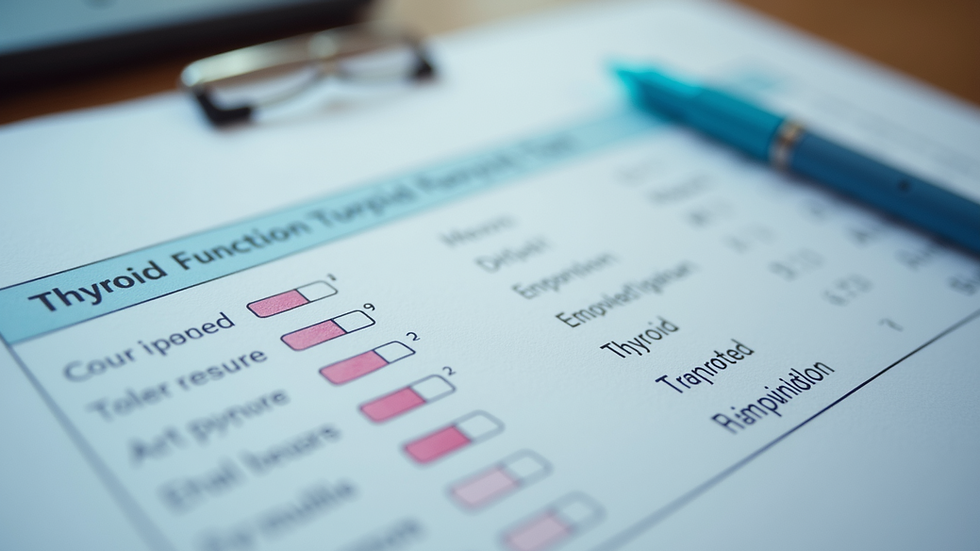How to Understand Your Thyroid Function Test (TFT) Report.
- Hyder Sultan

- Jun 27, 2025
- 3 min read
Understanding your health can sometimes feel like piecing together a challenging puzzle. One crucial piece of that puzzle, especially for those experiencing nagging symptoms, is the Thyroid Function Test (TFT). This test measures the levels of key thyroid hormones in your body, offering valuable insights into your metabolic health and overall well-being.
Overview of Thyroid Function Test (TFT)
The TFT is an essential diagnostic tool that evaluates the levels of thyroid hormones, including thyroxine (T4) and triiodothyronine (T3), along with thyroid stimulating hormone (TSH). These hormones are fundamental in regulating many bodily functions, such as metabolism, energy levels, and growth. For instance, TSH controls the secretion of T3 and T4, while these hormones influence almost every cell in the body, impacting everything from heart rate to body temperature.
Why is the TFT Done?
A healthcare provider may recommend a TFT for several reasons. Common reasons include:
Unexplained weight fluctuations: Changes of 5-10% of your body weight without a known cause may signal thyroid issues.
Temperature intolerance: Difficulty tolerating cold or heat can indicate an abnormal thyroid function.
Mood changes: Increased anxiety or depression symptoms are also linked to thyroid conditions.
Furthermore, the TFT is a routine part of medical evaluations for individuals over 60 and pregnant women, where the risk of thyroid disorders increases. In fact, studies show that about 10% of pregnant women may experience thyroid function abnormalities, making the TFT critical for managing maternal and fetal health.
Test Instructions
Before taking the TFT, it's vital to follow specific guidelines to ensure accurate results:
Fasting: No fasting is required before the test, making it convenient for most people.
Medication: If you're on thyroid medications, like levothyroxine, consult with your physician. Usually, it's suggested to continue medication until after your blood sample is drawn.
Alcohol: It's advisable to avoid alcohol in the days leading up to the test, as it can influence your results.
Following these instructions helps minimize external factors that could affect your thyroid health assessment.

Understanding the Results
Once your results are in, knowing how to interpret them is crucial. Your report will typically include levels of TSH, T3, and T4, with different measurement units used. Here’s a breakdown of the normal ranges, although exact values can vary by lab:
TSH: 0.4 - 4.0 milli-international units per liter (mIU/L)
Free T4: 0.7 - 1.9 nanograms per deciliter (ng/dL)
Free T3: 2.3 - 4.2 picograms per milliliter (pg/mL)
Interpreting Abnormal Results
High TSH: A high TSH level can indicate hypothyroidism, which means your thyroid is not producing enough hormones. Symptoms may include extreme fatigue, weight gain, and sensitivity to cold. For example, approximately 4.6% of American adults have hypothyroidism, especially women over 60.
Low TSH: A low TSH value may indicate hyperthyroidism, where the thyroid is overactive. Symptoms might include weight loss despite a normal or increased appetite, rapid heartbeat, and sweating. Studies show that hyperthyroidism affects about 1.3% of the U.S. population.
Abnormal T3 and T4 Levels: Changes in T3 and T4 levels can also help pinpoint issues. Elevated levels may suggest hyperthyroidism, while decreased levels often point to hypothyroidism.
Discussing your results with your healthcare provider is critical. They can explain what the numbers mean in the context of your health history and symptoms.
Following Up After Your TFT
The TFT is just the beginning when managing your thyroid health. Depending on your findings, your doctor may recommend additional tests or discuss lifestyle modifications. For those diagnosed with a thyroid condition, regular follow-ups are essential. For example, individuals on medication often require TFTs every 6-12 months to ensure their treatment is effective.
Key Takeaways for Thyroid Health
Understanding your Thyroid Function Test (TFT) results is crucial for your overall health management. With the right knowledge about the purpose of the test and how to interpret the results, you can take proactive steps toward better health. If you're experiencing symptoms suggestive of thyroid disorders, reach out to your healthcare provider to discuss the possibility of a TFT. Being informed about your thyroid health can lead to significant improvements in your quality of life.
Taking control of your health by understanding the TFT is an empowering journey. Knowledge is key to effectively addressing thyroid concerns, helping you to live a healthier and balanced life. Stay in touch with your healthcare provider; they can guide you through interpreting results and planning your next health steps.




Comments